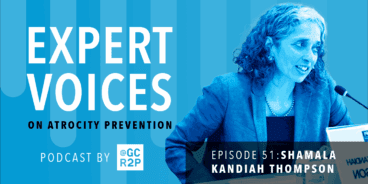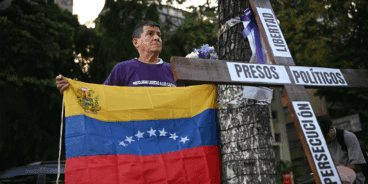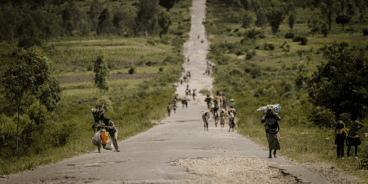
Open Letter to the United Nations Security Council on the Situation in Sudan
We write to you to express our profound concern about the risk of mass atrocities occurring in Sudan. The country stands today at a precipice with escalating atrocities and a potential return to all out war a real possibility. Tensions are increasing throughout the country and the South Sudan referendum is only seven months away, creating a potentially explosive situation. As signatories to the 2005 World Summit Outcome Document, you have a responsibility to protect the people of Sudan from genocide, war crimes, crimes against humanity and ethnic cleansing.
Atrocities are already occurring: murder, rape and displacement are rising in South Sudan. 2,500 South Sudanese have been killed and 350,000 people displaced in the past year alone. In the south, divisions among political factions, inter-ethnic violence over access to resources including cattle, and the proliferation of weapons, has increased insecurity. The failure to implement key provisions of the Comprehensive Peace Agreement (CPA), including north/south border demarcation, suggests that a peaceful January 2011 referendum is unlikely, if not impossible. Similarly the question of residency requirements for participation in the referendum in oil-rich Abyei, remains a potentially dangerous issue, especially as armies from the north and south are already on the region’s borders.
Nor may the Council ignore the threats to civilians elsewhere in the country. Civilians in Darfur continue to bear the brunt of ongoing fighting, with hundreds killed and thousands displaced during the past year. Attacks on humanitarian workers and convoys, and on the joint AU-UN mission, UNAMID, continue. The tenuous peace between the Government of National Unity and the Justice and Equality Movement is unraveling, and UNAMID’s ability to fulfill its mandate to protect civilians is hampered by its inability to reach those populations most at risk of atrocities. Meanwhile, the Lord’s Resistance Army continues to perpetrate atrocities, murdering hundreds and displacing thousands in Central and Western Equatoria states.
It is imperative that the Council develops a clear, country-wide strategy for averting and halting mass atrocities in the run up to the January 2011 referendum. If past mistakes are to be avoided, the international response must not be piecemeal and selective, privileging one region over another, or assuming that small indications of improvement in one area justify a shift in attention and efforts towards another. The Council must instead adopt a coordinated strategy to dissuade and deter potential perpetrators throughout Sudan from committing atrocities and ensure that measures are in place to respond swiftly should preventive efforts fail and atrocities occur.
On June 14th you will be meeting with Joint UN-AU Chief Mediator for Darfur, Djibril Bassole, the head of the AU Panel on Darfur, Thabo Mbeki, the Special Representative of the Secretary-General for Sudan and Head of Mission for UNMIS Haile Menkerios, and Joint AU-UN Special Representative for Darfur, Ibrahim Gambari. These envoys are one of the many prevention and protection tools that you have at your disposal to use as part of your strategy for saving lives and upholding your responsibility to protect.
Council members should use the opportunity of the meeting to raise concerns about the risk of atrocities in the next seven months in South Sudan, Darfur and the transitional areas of South Kordofan, Blue Nile and Abyei, to seek clarity on what the envoys are doing to deter crimes, and declare their readiness to support them in taking further action to prevent and protect. Specifically, Council members should:
-
-
- Urge the envoys to use every opportunity to convey to the Government of South Sudan and the Government of National Unity that the Council will not tolerate the commission of atrocities by security forces and that perpetrators will be held accountable.
- Ask the envoys to outline the status of efforts to disarm local populations and the ways in which the process can be accelerated.
- Ask SRSG Menkerios about the status of security sector reform within the South Sudanese police force and seek advice on what role Council members can play in speeding up the process.
- Seek clarity on how UNAMID and UNMIS are gathering information about potential risks to populations, including who the potential perpetrators are, what their incentives for perpetrating crimes are, and what levers can be used to change their calculus for committing atrocities.
- Demand that UNMIS and UNAMID’s presence on the ground, especially in remote areas, be expanded (increasing military, police, civil affairs, disarmament and human rights personnel) to undertake a more proactive civilian protection role, making use of its Chapter VII mandate if necessary.
- Declare your readiness to work with Troop Contributing Countries (TCC) to ensure that troops are deployed in a flexible manner in accordance with the protection mandates established by the Council.
- Ask the envoys to brief the Council on UNMIS and UNAMID contingency plans should atrocities occur and outline how Council members can aid in the development and implementation of such plans should that be necessary.
- Seek regular Council briefings and reports from the envoys in the immediate pre and post-referendum period.
- Commit to provide the resources necessary to ensure that UNMIS and UNAMID can fulfill their protection mandates, including the essential equipment and full troop deployment.
- Commit to work with the envoys to adopt a balanced and coordinated approach to addressing threats in Darfur, South Sudan and the transitional areas. This will include increasing efforts to strengthen the capacity of the Government of South Sudan to deal with immediate and post-referendum security and governance challenges.
-
Member states have a responsibility to protect the people of Sudan from what are preventable crimes. At this time, there is no clear common position amongst Council members or a coordinated strategy for using available measures and levers to prevent atrocities throughout the country. We urge Council members to use the opportunity of the June 14th meeting to send a clear message that collectively the Council will not be bystanders to a return of widespread atrocities and that all members will work with the envoys and the UN to uphold the responsibility to protect. Both the Council’s credibility and millions of lives are at stake.
Related Content


Atrocity Alert No. 464: Venezuela, Sudan and Nigeria
